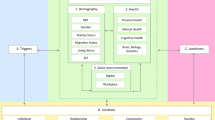Abstract
This paper argues that disabled people can be healthy. I argue, first, following the well-known ‘social model of disability’, that we should prefer a usage of ‘disabled’ which does not imply any kind of impairment that is essentially inconsistent with health. This is because (a) one can be disabled only because limited by false social perception of impairment and (b) one can be, if impaired, disabled not because of the impairment but rather only because of the social response to it. Second, I argue that it is often wrong to use the term ‘healthy’ in a way that makes health inconsistent with any degree whatsoever of health-relevant bodily dysfunction. Whether someone is ‘healthy’ properly-so-called depends on standards of health presupposed in conversational context. Sometimes, I argue, these standards are or ought to be lax enough to allow some people with some health deficits still to count as ‘healthy’ per se. Taking inspiration from David Lewis and Mary Kate Mcgowan, I go on to argue that denying that someone is ‘healthy’ in a context typically succeeds in shifting going presuppositions to require standards strict enough to make that denial acceptable. And this, I conclude by arguing, often constitutes an abuse of conversational power.
Similar content being viewed by others
Notes
References below, throughout.
More will be said later about the notion of ‘abnormal’ function; for now, I mean to use it in the standard medical sense explicated in (Boorse 1977) Boorse’s theory is of course controversial; I rely on it, arguendo, because it is the account of normal function least likely to support healthy disability. For a particularly trenchant line of criticism of Boorsean views, here, see (Amundson 2000).
A locus classicus for this view is (Oliver 1990) Oliver theorizes the classical ‘British’ social model powerfully expressed in: Union of the Physically Impaired Against Segregation, Fundamental principles of disability, (London: Union of the Physically Impaired Against Segregation, 1976). Cf. (Wasserman et al. op. cit. For discussion of further varieties of the social model.
Americans with Disabilities Act of 1990. Public Law 101–336. §§ 12,102. 108th Congress, 2nd session (July 26, 1990).
Nb.: Baron-Cohen uses ‘disability’ to mean what I mean by ‘impairment’.
Compare, on race: (Haslanger 2000).
Again, I presuppose this Boorsean view of health arguendo.
Note that, if this claim is mistaken, and ‘healthy’ is actually more like ‘tall’, then the conclusion of this section follows without the foregoing complications: there is in that reason not even prima facie reason to think that anyone with an impairment is ‘unhealthy’ because less healthy than they can be.
Cf. here Peter Unger on knowledge; (Unger 1975); also Kennedy (op. cit.).
Made in various places, but deployed and explained for purposes most clearly related to the present ones in “Elusive Knowledge” op. cit.
By ‘healer’ I mean: physician, dentist, nurse, physical therapist, etc.
Cf. again (Lewis 1996), on knowledge.
I owe this point to David Wasserman.
References
Amundson R (2000) Against normal function. Stud Hist Philos Sci Part C 31:33–53
Assaf T, Galit S (2011) Absolute vs. relative adjectives: variance within vs. between individuals. Proc SALT 21:135–154
Baron-Cohen S (2002) Is Asperger syndrome necessarily viewed as a disability? Focus Autism Dev Disabil 17:186–191
Bickenbach J (2013) Disability, “Being Unhealthy,” and Rights to Health. J Law Med Ethics 41:821–828
Boorse C (1977) Health as a theoretical concept. Philos Sci 44:542–573
Boorse C (1997) A rebuttal on health. In: Humber JM, Almeder RF (eds) What is disease? Humana Press, New York, pp. 1–134
Grandin T (2006) Thinking in pictures. My Life with Autism, Reissue edition. Vintage, New York, Expanded Edition
Grandin T (2010) The World Needs all Kinds of Minds TED2010
Haslanger S (2000) Gender and race: (what) are they? (what) do We want them to Be? Noûs 34:31–55
Haslanger S (2012) Resisting reality: social construction and social critique. Oxford University Press, Oxford
Kennedy C (2007) Vagueness and grammar: the semantics of relative and absolute gradable adjectives. Linguist Philos 30:1–45. doi:10.1007/s10988-006-9008-0
Lewis D (1996) Elusive knowledge. Australas J Philos 74:549–567
Matlin M (2007) “Leading Lady” for People With Disabilities. International Labour Organization
McFadden T (2014) http://www.tatyanamcfadden.com/biography.html. Accessed 8 Jul 2014
Mcgowan MK (2004) Conversational Exercitives: something Else We do with our words. Linguist Philos 27:93–111
Mcgowan MK (2009) Oppressive speech. Australas J Philos 87:389–407
Oliver M (1990) The politics of disablement: a sociological approach. Palgrave Macmillan, Basingstoke
Shakespeare T (2006) Disability rights and wrongs. Routledge, Abingdon
Tremain S (2002) On the subject of impairment. In: Corker M, Shakespeare T (eds) disability/postmodernity. Lexington, New York, pp. 32–47
Unger P (1975) Ignorance: a case for Scepticism: a case for Scepticism. Oxford University Press, Oxford
Wasserman D, Asch A, Blustein J, Putnam D (2013) Disability: definitions, models, experience. In: Zalta EN (ed) The Stanford Encyclopedia of Philosophy, Fall 2013.
Wendell S (2001) Unhealthy disabled: treating chronic illnesses as disabilities. Hypatia 16:17–33. doi:10.1111/j.1527-2001.2001.tb00751.x
Acknowledgments
Thanks to David Wasserman, Steve Campbell, and several blind reviewers for helpful comments on drafts. Thanks also to the members of the NIH Department of Bioethics, for many useful discussions. N.b.: the views propsed here do not represent the views of said Department; the NIH, or the US Federal Government.
Author information
Authors and Affiliations
Corresponding author
Rights and permissions
About this article
Cite this article
Aas, S. Disabled – therefore, Unhealthy?. Ethic Theory Moral Prac 19, 1259–1274 (2016). https://doi.org/10.1007/s10677-016-9735-4
Accepted:
Published:
Issue Date:
DOI: https://doi.org/10.1007/s10677-016-9735-4




